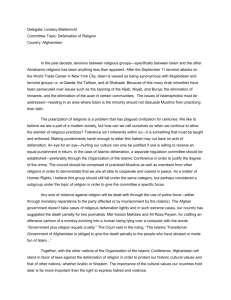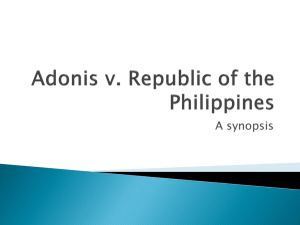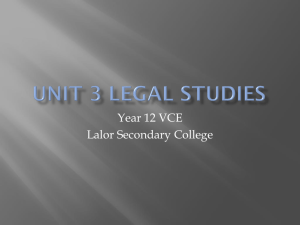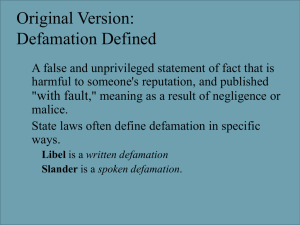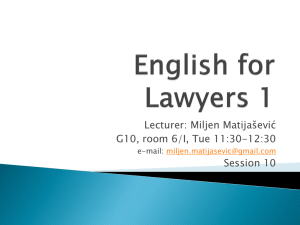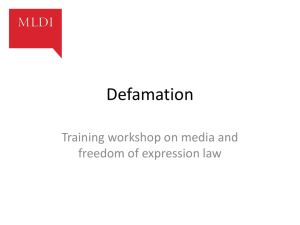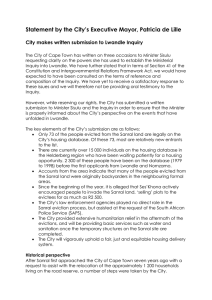criminal defamation - Global Freedom of Expression
advertisement
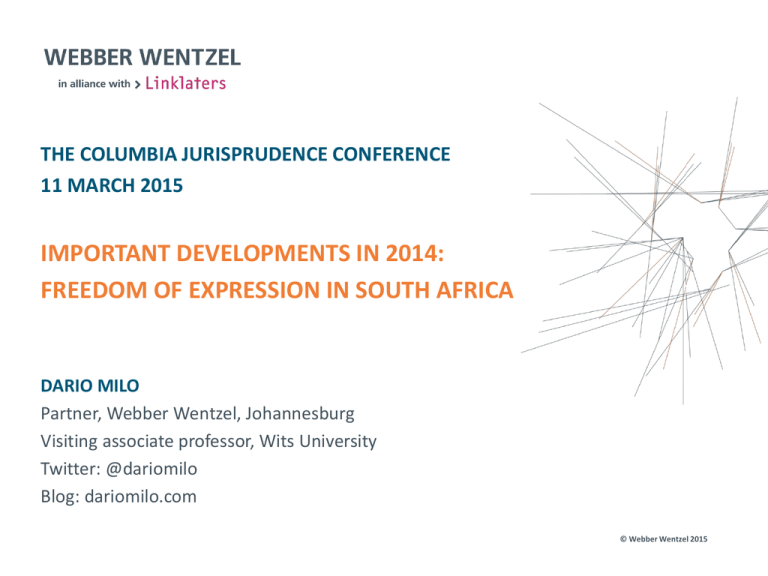
THE COLUMBIA JURISPRUDENCE CONFERENCE 11 MARCH 2015 IMPORTANT DEVELOPMENTS IN 2014: FREEDOM OF EXPRESSION IN SOUTH AFRICA DARIO MILO Partner, Webber Wentzel, Johannesburg Visiting associate professor, Wits University Twitter: @dariomilo Blog: dariomilo.com © Webber Wentzel 2015 PART 1: FREEDOM OF EXPRESSION IN SOUTH AFRICA IN 2014 • THE GOOD, THE BAD AND THE UGLY: see DARIOMILO.COM – "2014: A Bumper Year for Media Law" • KEY COURT DECISIONS IN 2014: o o o o MORE ACCESS TO COURTS • Access to broadcast Oscar Pistorius' trial for murder LESS ACCESS TO COURT DOCUMENTS • High Court's decision in SANRAL v City of Cape Town MORE ACCESS TO INFORMATION • Access to the Khampepe-Moseneke report regarding Zimbabwe elections • National Key Points Act: Right2Know Campaign v Minister of Police • ArcelorMittal (access to information held by private bodies) CRIMINAL DEFAMATION: • Alive and well in South Africa, but not in Zimbabwe 2 PART 2: WHAT TO WATCH OUT FOR IN 2015 • CASES Broadcasting Parliament case o Judgment in appeal of court documents case in Sanral v City of Cape Town • LEGISLATION o Protection of State Information Bill o Regulation of internet content o 3 MORE ACCESS TO COURTS BROADCASTING OSCAR PISTORIUS' TRIAL 4 BROADCASTING OSCAR PISTORIUS' TRIAL • First time criminal case broadcast in South Africa • Entire trial could be broadcast by live audio • The media could televise or livestream: the opening and closing arguments o any interlocutory applications o the judgment o the evidence of the experts and police witnesses for the state o as well as any lay witness who consented to being televised • Judge accepted was necessary to balance open justice with fair trial • This gave public firsthand account of what had happened in trial o • Court referred to the Thatcher case (SA case) which conducted a detailed comparative analysis of the legal landscape on broadcasting in the UK, USA, Canada, Australia, New Zealand, Germany, France, Italy 5 LESS ACCESS TO COURT DOCUMENTS: Western Cape High Court's decision in Sanral v City of Cape Town 6 JUDGE BINNS-WARD'S DECISION IN SANRAL V CITY OF CAPE TOWN • Case concerns the City of Cape Town's judicial review of a decision in terms of legislation to declare part of two key national highways as toll roads. • In an interlocutory application the South African National Roads Agency Limited (SANRAL) argued that part of the City’s supplementary affidavit should not be made public, as it contained sensitive and confidential information provided to the City by SANRAL in the litigation. 7 JUDGE BINNS-WARD'S DECISION IN SANRAL V CITY OF CAPE TOWN • Court interpreted Rules as only permitting access by the High Court • • • • registrar to persons with a direct legal interest in the case – this would typically exclude the media. Court held that a party to litigation who receives documentation from his opponent under compulsion in terms of the rules, cannot make that documentation public without the consent of his opponent – OR amounts to contempt of court. Court stated that the media could bring a court application for access – an expensive and slow process. Presently on appeal - March 2015 Supreme Court of Appeal hearing Court referred extensively to cases in England as well as cases in Canada, USA and Australia 8 MORE ACCESS TO INFORMATION UNDER FOI LEGISLATION 3 KEY CASES IN 2014 – INTERNATIONAL RELATIONS NATIONAL SECURITY POLLUTION BY A CORPORATION CASE 1: KHAMPEPE-MOSENEKE REPORT • In 2002 the former President, Thabo Mbeki, dispatched two sitting judges (Deputy Chief Justice Dikgang Moseneke and Justice Sisi Khampepe) to Zimbabwe to conduct an investigation on the elections. • Judges sent "to assess the constitutional and legal challenges that had emerged in Zimbabwe and to report on those matters to the President directly in confidence". 10 ACCESS TO INFORMATION: KHAMPEPE-MOSENEKE REPORT • The matter was heard by 22 judges over the course of 6 years • The case illustrates the length to which the state will sometimes litigate to • • • • • prevent embarrassing information being made public At one stage, report mysteriously disappeared from chambers of High Court judge who was deciding case Justice Fritz Malan in the Supreme Court of Appeal referred to one of the presidency’s litigation tactics as “an abuse of process that cannot be tolerated” Eventually judges took "judicial peek" at report and rejected Presidency's grounds of refusal based national security grounds (that report was commissioned to inform policy and that it contained confidential communications from Zimbabwe state officials) Constitutional Court refused leave to appeal by presidency Constitutional Court case (2011) referred to cases in USA, Canada and Australia 11 NATIONAL KEY POINTS ACT: RIGHT2KNOW V MINISTER OF POLICE • PAIA Request by the Right2Know campaign for a list of the structures deemed 'National Key Points' under the National Key Points Act. • Refusal by the State was justified on basis that key points were "pivotal" to the "security" and "stability" of the country and by disclosing the list would prejudice the security of the owners and the "defence and safety" of the country. 12 RIGHT2KNOW V MINISTER OF POLICE • Judge found that state had not put up enough evidence that justified the grounds for refusal• no foundation for idea that individuals will or may be harmed; and • no evidence that disclosure of key points will threaten security of the Country. o The attempt to keep the list secret was undermined by the fact that ministers had furnished details of key points to Parliament “for the whole world to know, including, presumably, those dark forces that lurk in wait to disturb our tranquility”. 13 ARCELORMITTAL AND PRIVATE BODIES • Significant case concerning a private body • Vaal Environmental Justice Alliance was successful in PAIA application for information relating to ArcelorMittal's operational and strategic approach to the protection of the environment into the areas where it operates steel plants. • Usually a requester has to meet a strict threshold requirement that it requires the records sought for the exercise of protection of its rights. • The Supreme Court of Appeal held that as advocates for environmental justice, the requester was entitled to rely on various environmental law statutes in complying with the threshold requirement. The statutes emphasised the importance of consultation and interaction with the public. 14 CRIMINAL DEFAMATION Alive and well in South Africa, but not in Zimbabwe ZIMBABWE: CRIMINAL DEFAMATION 16 ZIMBABWE: CRIMINAL DEFAMATION • June 2014: In Madanhire v A-G Court delivers impressive, unanimous judgment per Patel JA o What is distinctive about criminal defamation is the stifling or chilling effect of its very existence on the right to speak and the right to know o Moreover, there is an appropriate and satisfactory alternative civil remedy that is available to combat the mischief of defamation o It is a disproportionate instrument for achieving the intended objective of protecting the reputations, rights and freedoms of other persons o It is not reasonably justifiable in a democratic society • Referred to learning from international and regional bodies: o o United Nations Commission on Human Rights and Human Rights Committee, African Commission on Human and Peoples’ Rights Referred to South Africa article by Ben Winks and Vinayak Bhardwaj 17 ZIMBABWE: CONTINENTAL SHIFT? • African Court of Human and Peoples' Rights, Konate v Burkina Faso (also 5 December 2014) o Majority of 6: Criminal defamation is not, as such, incompatible with the African Charter, but it should never be punished by imprisonment o Minority of 4: There is no justification for any criminal sanction for defamation, custodial or not, as the civil law should be sufficient • Court referred to cases and learning from the UN Human Rights Committee, the ECHR, and the Inter-American Court 18 CRIMINAL DEFAMATION • But in South Africa –the crime of defamation upheld • High Court of South Africa, Motsepe v The State (also 5 December 2014) o o o Mag Court imposed R10 000 fine or 10 months' imprisonment (suspended for 5 years on condition that the appellant not convicted of criminal defamation during the period) Freedom of expression is not unlimited Though criminal defamation undoubtedly limits freedom of expression, this is reasonable and justified in an open and democratic society • On the facts: found that journalist didn't have intention to defame, so not guilty • Court referred to learning from African Commission on Human and Peoples Rights, the ECHR, the United Nations, the Organisation of American States and the Organisation for Security and Cooperation in Europe and a decision by the Privy Council 19 PART 2: WHAT TO WATCH OUT FOR IN 2015 20 PART 2: WHAT TO WATCH OUT FOR IN 2015 • Judgment in the 'Broadcasting Parliament' case o o o Media freedom in Parliament Recent urgent application for an interim interdict to prevent Parliament from jamming communications and from failing to broadcast disturbances during the South African 2015 State of the Nation Address Matter being argued in April 2015 21 MEDIA FREEDOM IN PARLIAMENT 22 NATIONAL SECURITY: THE PROTECTION OF STATE INFORMATION (SECRECY) BILL • On 12 November 2013, the South African • • • • National Assembly adopted a revised version of the Secrecy Bill, with 225 members of Parliament voting in favour and 88 voting against. The Secrecy Bill was sent to President Jacob Zuma for assent in December 2013. Still awaits his signature Creates offences of possession and disclosure of classified information with limited defences Following Al Jazeera's and The Guardian's release of "Spy Cables" involving SA's National Intelligence Agency, likely that Bill will be signed into law soon 23 THE FILMS AND PUBLICATIONS BOARD – PROPOSED REGULATION OF INTERNET CONTENT • Crux of the Policy: provides for a system of co-regulation of online content whereby a distributor of online content could either submit publications to the Board for classification or could conclude an online distribution agreement in terms of which the distributor may become accredited to classify its online content prior to distribution. o Purports to apply to films, games and "certain publications" • Crucially - draft policy provides that it's impermissible to distribute digital content in the Republic of South Africa unless such content is first classified and the classification is displayed • Also purports to empower FPB to demand take-down of user-generated content where the content has not been classified 24 CONCLUSION • 2014 was a significant year for media law in South Africa o o o Cutting-edge cases (eg broadcasting the Pistorius trial) The courts generally responded well (as have in the past) But very disappointing judgments upholding criminal defamation and restricting access to court records • Much to celebrate but go into 2015 knowing many legislative and executive threats to media freedom await us 25
